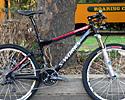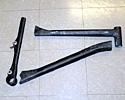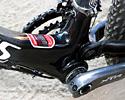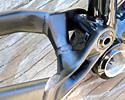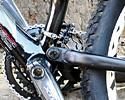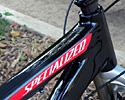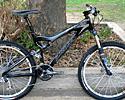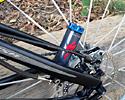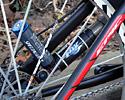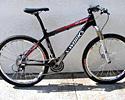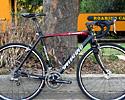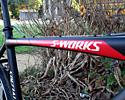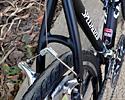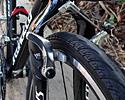
Recently on Cyclingnews.com |
Tech feature: Specialized 2006, September 24, 2005 - part twoSpecialized gets its carbon dirtyWith all the attention Specialized has lavished on its road line for 2006, you could be forgiven for wondering if it had any time and energy left over for the mountain bike side. It certainly did, James Huang discovers.
Carbon fiber is again the name of the game for Specialized's new S-Works mountain bikes. Some may say that Specialized has lagged behind in incorporating carbon fiber in mountain bike frame design but they have certainly jumped in with both feet for '06 having introduced three all-new carbon XC frames.
Specialized's new Az-1 carbon construction technique also finds its way into the new carbon mainframe of its revolutionary terrain-sensing Epic FSR XC full-suspension design . The switch to carbon fiber not only drops weight as compared to aluminum, but also dramatically increases torsional rigidity for more precise handling and snappier response.
The bottom bracket area is heavily reinforced for maximum drivetrain rigidity and the massive front end now incorporates an integrated headset design . Travel of the new M5 aluminum four-bar rear end is increased to 100mm of travel in a new lighter and stiffer asymmetric design . Total frame weight including paint and shock now is only 2300g. Most models will be disc-specific, but US buyers can also opt for a rim-brake version . The longer-travel XC/Endurance S-Works Carbon Stumpjumper FSR also receives similar treatment with an all-new Az-1 carbon front triangle and asymmetric M5 four-bar aluminum rear end . Rear travel on the Stumpjumper has also been increased by 10mm, making for a total of 130mm and the entire frame weighs only 2450g. As with the Carbon Epic, the carbon front end drastically increases torsional stiffness but also incorporates a dramatically swoopy appearance that I honestly wish had carried over to the Epic a bit (but hey, that's just my opinion). In any event, perhaps the most exciting development in the S-Works Carbon Stumpjumper is the addition of a remote Brain unit that lends Epic-like pedaling efficiency to the Stumpjumper's longer travel legs.
Both of the terrain sensing Brain-equipped Fox shocks on the Epic and Stumpjumper also incorporate a new tuning feature called Brain Fade. Previous Epic designs certainly did a good enough job of locking out when the trail was smooth, but some criticized the system for having too much of an "off-on" feel. The Brain Fade feature softens that transition a bit and should make for better overall trail performance on both bikes . The Epic's adjustment range, however, is still significantly stiffer than that of the Stumpjumper and retains its superior pedaling response.
Specialized still hasn't forgotten its hardtail roots with the introduction of its third carbon mountain frame, the S-Works Carbon HT . The primary goal of this frame was a giant leap forward in frame rigidity and drivetrain response over its previous M5 aluminum version. The end result weighs only 1100g. The disc-only configuration certainly offers comment on what direction (at least in terms of how to stop) Specialized thinks the XC racer crowd is going these days . Last year's S-Works M5 HT was revamped as well and now wears a novel asymmetric seatstay design . Getting cross
The Tricross is Specialized's new-for-'06 cyclocross line . This new cross platform incorporates a number of thoughtful features courtesy of Andy Jacques-Maynes, pro cross rider for the Webcor squad in the US, who provided development help for Specialized's designer. Although it may not be carbon, the S-Works E5 Aerotec SLX aluminum frame is still super light at only 1300g. The flattened underside of both the top tube and down tube makes for easy portaging . The slightly curved top tube and S-bend stays provide a bit of vertical compliance and combine with the Zertz-equipped carbon fiber fork to smooth out the ride and damp vibration . After a long weekend on the UC Santa Cruz campus, a couple of things became quite clear. First, if I ever have kids, there is no way I'm letting them go here unless they've won the lottery beforehand. Secondly, Specialized's designers and engineers clearly don't work here since they've obviously been very busy! PhotographyFor a thumbnail gallery of these images, click here Images by James Huang
|

